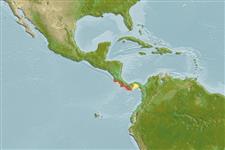Environment: milieu / climate zone / depth range / distribution range
Ecology
Marine; demersal; depth range 5 - 30 m (Ref. 11482). Tropical; 11°N - 7°N
Eastern Central Pacific: Gulf of Nicoya (Costa Rica) to the Secas Islands (Panama).
Size / Weight / Age
Maturity: Lm ? range ? - ? cm
Max length : 13.0 cm SL male/unsexed; (Ref. 9277)
Dorsal spines (total): 2; Dorsal soft rays (total): 22. Sharp venomous spine on upper rear corner of gill cover; hair-like filaments on head and body generally extending below infraorbital canal of head and below lateral line on body, reaching posteriorly on back as far as eighth ray of second dorsal fin (Ref. 11482).
Found on sand and mud bottoms (Ref. 11482).
Life cycle and mating behavior
Maturities | Reproduction | Spawnings | Egg(s) | Fecundities | Larvae
Allen, G.R. and D.R. Robertson, 1994. Fishes of the tropical eastern Pacific. University of Hawaii Press, Honolulu. 332 p. (Ref. 11482)
IUCN Red List Status (Ref. 130435)
Threat to humans
Harmless
Human uses
Tools
Special reports
Download XML
Internet sources
Estimates based on models
Preferred temperature (Ref.
123201): 27.6 - 28.7, mean 28.2 °C (based on 38 cells).
Phylogenetic diversity index (Ref.
82804): PD
50 = 0.5312 [Uniqueness, from 0.5 = low to 2.0 = high].
Bayesian length-weight: a=0.00490 (0.00187 - 0.01281), b=3.15 (2.93 - 3.37), in cm total length, based on LWR estimates for this (Sub)family-body shape (Ref.
93245).
Trophic level (Ref.
69278): 3.5 ±0.5 se; based on size and trophs of closest relatives
Resilience (Ref.
120179): High, minimum population doubling time less than 15 months (Preliminary K or Fecundity.).
Fishing Vulnerability (Ref.
59153): Low vulnerability (10 of 100).
